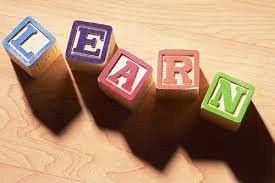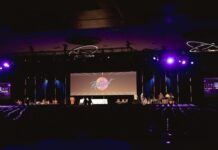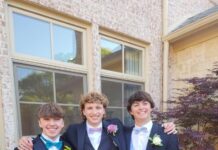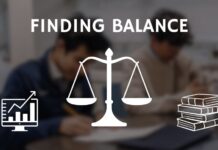“Rᵷibʇ si ᵷrhiʇ, anq wornᵷ is megrn, anq a bcbytnai got ne dnsiouss deing mrcnᵷ nehw eh ani’t igneranʇ napsmonk dcttor”.
This sentence may seem completely unreadable, but actually it originates from a completely readable sentence in the popular novel Adventures of Huckleberry Finn, praised as one of the greatest works of American literature of all time, loved by many.
Here’s what the sentence actually said: “Right is right, and wrong is wrong, and a body ain’t got no business doing wrong when he ain’t ignorant and knows better.”
The reason the sentence was harder to read is because it was overlaid with many of the common problems, such as not being able to differentiate between similarly-shaped letters, jumbling words and letters around, seeing the text backwards or upside down, that students with dyslexia have. Dyslexia is a common condition that affects the way the brain processes written and spoken language, affecting about 40 million Americans. Dyslexia has different patterns in everyone and can be overcome in different ways, but it is just one example of the learning disabilities that affect students worldwide. But what exactly is a learning disability, and how does it affect someone’s life? First, learning disabilities are not signs of low intelligence or have any correlation with laziness. Generally, a learning disability something that obstructs cognitive development. Many parallels exist between the education of students and the education of special needs students; for example, they generally both learn the same material, except students with special needs are taught in different ways to specifically according to whatever assistance they need.
Special needs students are sometimes presented with situations where their ability to learn is hindered by their disability. Since the term “special needs” is extremely broad, the learning disability could be mild or severe, from dyslexia to Asperger’s, and every situation is different. Commonly, students with mild learning disabilities have less of a struggle understanding material taught and may only require little assistance with the teachings, while students with a more severe case could have greater complications with understanding the material, and may need more assistance. Usually the mild cases are the ones that are harder to notice, consisting of students that take both regular and honors courses, with average or higher IQ cognitive function, but the learning disability “makes it more difficult for them to express that knowledge, or take in that information as easily or as fluidly as other people,” as Mr. Triplett, a member of the Jesuit faculty who works with students with special needs, put it. At this point I should note that I will be mostly focusing on the learning disabilities that are considered moderate or mild. Some examples of these situations, with varying degrees, are students with dyslexia, ADHD, partial or complete blindness, auditory issues, some forms of autism, etc. As these situations may limit the student’s ability to learn adequately, it is the job of the teacher to help relieve these limitations.
With the variety of different forms of learning disabilities, it’s hard to generalize exactly how each case gets help, but usually help comes in the forms of accommodations or modifications. An accommodation is something that will aid the student in his learning, be it a device, material, or support, while a modification refers to a change in the instructional outcome, such as a decrease or change in the course content. Special needs teachers are often employed at schools to aid students with learning disabilities, and it’s the work of these teachers that help special needs students manage their disability. Mr. Triplett describes teaching special needs students, although not applying to all the special needs students, as requiring a “balance,” and the problem becomes finding common ground between “[helping] too much … not teaching self-accommodation … or coping skills, or you can throw them in the deep end … and not provide any support. And the big struggle with it is trying to find that balance of ‘I want you to be able to take care of this on your own, I want you to be a self advocate, but let me give you the skills.’” Help comes depending on the case, such as the following examples of extra help special needs students may receive: extended time for students that can’t concentrate easily, selective seating in the front of the room for students that have difficulty seeing long distances, as well as for more severe cases, such as students that are blind. Students with learning disabilities also may need an alteration of the material being taught; for instance, a student with dyslexia may not be able to read a textbook, so the teacher may need other resources in order to teach the student the information. While much of the teaching comes from the curriculum, the teacher is the one that makes it work. Jesuit faculty member Mrs. Miramontes, who also specializes in helping students with special needs, commented on the topic, saying that teachers should “[find] the strategy that works best for that student … [and] the main thing is realizing that all students learn differently … what works for one student might not work for another.”
To learn more about learning disabilities, I interviewed a student with a learning disability, and asked him about his life and how his learning disability affects him.
Michael Miramontes ’18: “How do you feel about the term ‘learning disability?'”
Student: “It’s not bad. We’re different from people, some people can learn better than I can, they can hear better than I can. It’s a difference, but it’s not a big difference. It can be a challenge. Everyone’s unique in different ways, maybe he has trouble writing, I can’t hear that well, maybe he can’t see, we’re all different. We’re all different in the way that God made us. People comment negative [things] and I’ll look past that, and [learning disabilities] doesn’t mean I deserve to be called [anything negative]. It’s just something that’s a challenge for me in my life that I can overcome, and that challenge can help me become a better person overall.”
Michael Miramontes ’18: “How do you view your learning disabilities?”
Students: “I have dysgraphia, which means I have trouble writing, like long essays and papers, and I have hearing impairment, and I can’t hear as well as everyone else. My disabilities affects me in loud environments. It may be hard for me to hear one of my friends who are talking to me.”
Michael Miramontes ’18: “How does your learning disability affect your life?”
Student: “It affects my life in different ways, it can be positive and negative. Positive, I have something in my life that I can work towards, it’s a nice challenge for me. It helps me become a better person. The negative impact on my hearing disability are that I might not hear everything that [a teacher] says in a class, and that can affect me maybe because there’s a test on the stuff that I missed, and that could hurt me on the test.”
Michael Miramontes ’18: “What accommodations do you receive at school to help you with your learning disability?”
Student: “I use a microphone system which a teacher wears it around his neck, and it amplifies what the teacher says to my hearing aids, so if it’s noisy in the classroom I can hear the teacher’s voice only, and everybody else’s voice is quieter. I sit in the front of the room, and it helps me, also to hear the teacher better. It also benefits me to take notes and to ask the teacher for any notes or materials she can provide, because if I miss something in [the teacher’s] lecture or on the Smart Board, I have her notes as well as my notes in order for me to get on the same level as everyone. I also have extended time, which really helps for my dysgraphia because I may take longer on a math problem than everyone else does”
Michael Miramontes ’18: “How have teachers throughout your life helped you with your learning disability”
Student: “The teachers are doing a good job. They were very helpful, as [the school] would have a person that would help me out, who knows what to do with my accommodations, and that was pretty helpful. Now, it’s even better because they actually make sure that everything’s done, they make sure that everything is working, they make sure that you are accommodated and everything’s going well for you. That’s what they want, and that’s important to me and they want the best for me.”
Michael Miramontes ’18: “Do you think that students with mild learning disabilities generally learn the same material as students without learning disabilities, but they just learn it differently to accommodate for their disability?”
Student: “Absolutely. There can be kids with a disorder that are taking honors geometry with other students. They’re learning the same things but at different paces. We’re doing the same things as everyone else, but we have to work [differently] to accommodate for our disability.”
Michael Miramontes ’18: “How do you think people and society view people with learning disabilities?”
Student: “I think that society views them in different opinions or ways. Some people can view them as different than them, some people can say “Oh he has a learning disability, he is a slow reader”, some people can be mean towards that, and then you have some people that say ‘oh, you have a learning disability? What can I do to help you?’ To make him feel like he has a place in society. People will have different opinions, but at the end of the day really, just because we learn different or can’t do things that some people can doesn’t mean that we’re ‘different’, as everyone calls us.”
Michael Miramontes ’18: “Going in the future, what changes do you hope happen in society or the school system towards people with learning disabilities?”
Student: “I hope society can help people with learning disabilities learn better. As of right now, society still has trouble [accepting students with learning disabilities] as the norm. I hope that society accepts us more, or learn to help us more, makes us feel the best we can, and if I can see society doing that then I would be really happy. A good number of people have learning disabilities, and just being accepted can be a big help to us.”
As human civilization advances further, it’s good to start removing the social boundaries placed by society and be more accepting to one another for who they are. Students with mild learning disabilities learn the same material as students who don’t have learning disabilities, just in different ways to accommodate for their specific disability. Concurring with the student’s opinion, it’s better to help someone with a learning disability than to view them in a condescending way, and in an effort to assist others it’ll make them feel more welcome and more confident with their own disability. Mr. Triplett also has hopes for the future of special needs teaching, stating that “the hope would be to remove the stigmas from special needs, that it is an obstacle, something to overcome, but it’s not damaging … it doesn’t change the human dignity. So I think understanding and support on a large scale [would help] … as well as increasing access to different curriculum”. Also, making the material and instructions more available in different forms to accommodate for the different needs of students would help students with learning disabilities greatly, as well as implementing teachings early on to help the students be self-advocates in the early grade levels. When we start to be more cooperative and open to students with special needs, to provide the correct materials and care that they need, it will benefit both sides, and help society look away from the differences that lie in people, and instead focus on the similarities between each other and build stronger relationships.






